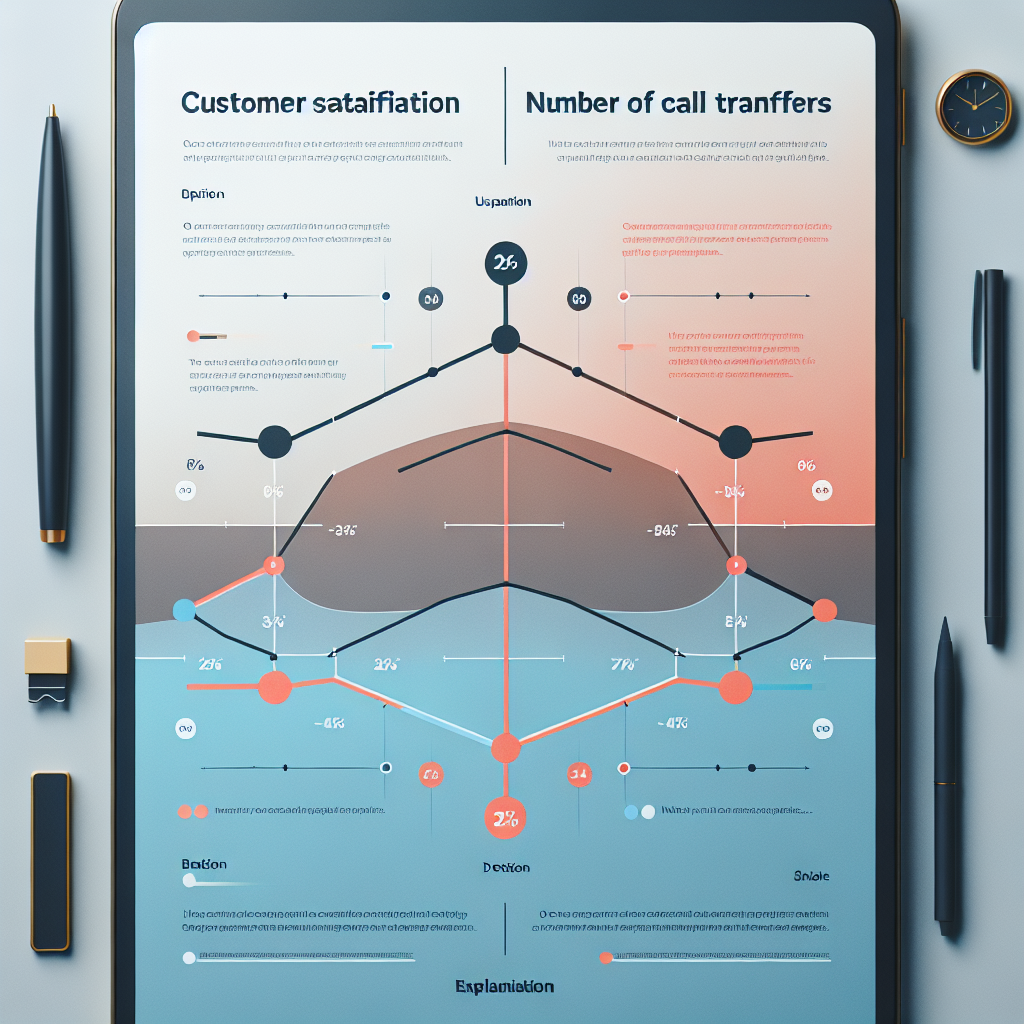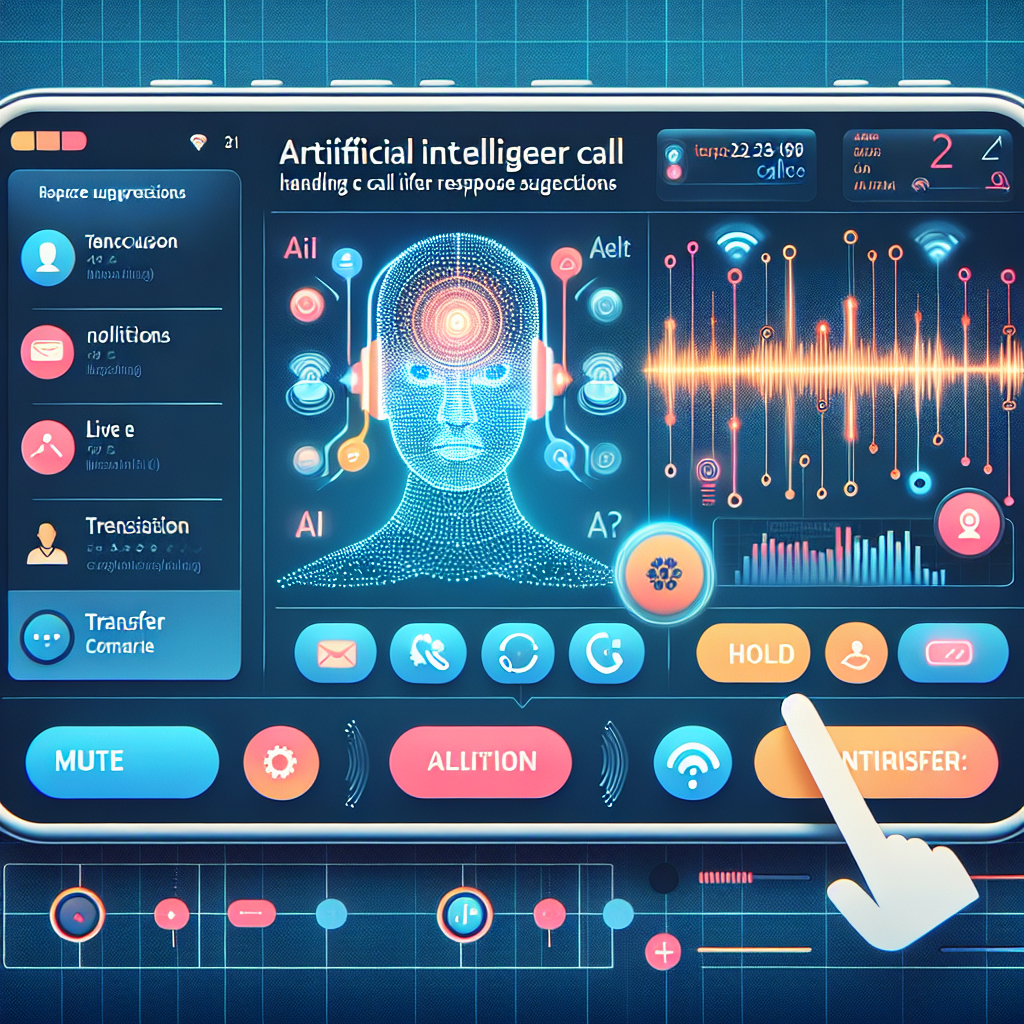
In recent years, automation has altered the face of business operations, particularly in the realm of customer service. One area where the impact is evident is in call handling, which historically has been prone to high transfer rates due to several reasons. Now, with the advent of Artificial Intelligence (AI), companies are experiencing profound efficiencies in this area. This technology not only helps reduce transfer rates but also enhances customer interactions.

Transfer rates in call handling are a crucial metric to track in customer service, with high transfer rates often indicating the lack of first-call resolution and subsequent customer dissatisfaction. Traditional call handling involves numerous transfers due to the non-standard delivery of services, lack of training, or the complexity of the questions asked by customers. Reducing these rates significantly improves customer satisfaction and reduces operational costs.
In responding to the call for more efficient procedures, AI has proven itself a valuable ally in the sector. With sophisticated techniques such as Natural Language Processing (NLP) and Machine Learning, AI facilitates better comprehension of customer inquiries. These tools enable automatic classification and routing of calls to the right department, hence reducing transfer rates. Moreover, AI can provide real-time assistance to service representatives, improving the resolution of customer queries on the first call.
Further, AI technologies can analyze past interactions and learn from them to anticipate customer needs, therefore proactively addressing potential issues. It leads to improved service delivery and vastly heightened customer satisfaction, contributing to a more streamlined and effective customer service experience.
Overall, the introduction of AI in call handling is ushering in a new era for customer service in businesses. Effectively leveraging these tools can help businesses reduce transfer rates dramatically and ensure high-quality customer interactions.
Artificial Intelligence (AI) is taking the world of customer service by storm and one area in which its impact is significantly felt is the world of call handling. AI systems are integrated with key features such as natural language understanding, call routing intelligence, and real-time decision making to assist businesses in reducing their transfer rates. These systems not only offer smart solutions, but also provide a comprehensive approach to call handling.
This is a pivotal aspect of an AI call handling system. Rather than engage customers using predefined scripts, complex machine learning models provide these systems with an understanding of the context and connotation of natural human communication. They can discern tone, understand colloquial language, detect customer sentiment, thus providing more personalized engagement.
An AI call-handling system comes with advanced call routing capabilities. By analyzing the caller's intent and needs, such a system can guide each call to the most appropriate agent. This eliminates unnecessary call transfers, leading to a more efficient and satisfactory customer experience.
Last, but certainly not the least, is the system's ability to make real-time decisions. Comprehending the caller's request efficiently, AI then implements relevant actions instantly. This not only accelerates the process but also ensures the resolution of most concerns on the first call itself, thereby reducing transfer rates significantly.
To sum up, AI systems are now endowed with features that make them a vital part of a business's customer service infrastructure. Whether it's understanding clients on a more personal level, routing calls smartly, or making swift decisions, these systems are redefining 'service' in customer service.
Implementing AI-powered solutions as a strategy to reduce call transfer rates can offer several notable benefits. One of these assets lies in significantly improving customer satisfaction. To this end, AI features like faster response times, efficient self-service options and personalized handling can earn customer trust by decreasing the chances of call redirection - an often exasperating experience.
The result of this reduction in call transfers is not only more satisfied customers, but also a potential increase in brand loyalty and positive word-of-mouth. After all, as research finds, good customer service can indeed lead to higher loyalty.

Besides customer satisfaction, reduced wait times also serve as another distinct advantage. When used correctly, AI-driven tools can process customer inquiries much faster by eliminating the need to transfer these calls to another department or team. In turn, this efficiency enables quick resolution of customer issues, further contributing to satisfaction and trust.
Without the requirement for intermediate intervention, the need for call transfers can be minimized to a grand extent. By using AI solutions, call handling becomes not just more streamlined but also more efficient. Consequently, support teams are enabled to handle more queries in a shorter span, thereby increasing the overall productivity.
While there are many more benefits to reducing call transfers via AI, the ones highlighted here emphasize the potential of AI in revolutionizing contemporary call center protocols. Implementing AI-powered solutions is thus a promising strategy for organizations seeking to enhance their customer service capabilities and come out on top in this aspect of competitive differentiation.
Two compelling case studies that demonstrate the transformative power of AI in call handling involve insurance powerhouse MetLife and cloud communications leader Twilio. These companies have successfully utilized cutting-edge AI solutions, significantly improved their call handling capacity, and set a benchmark in their industry.
MetLife, a global provider of insurance, annuities, and employee benefit programs, teamed up with Cogito, an AI software that offers real-time emotional intelligence support. Adopting this innovative AI system had remarkably enhanced their customer interactions. The AI system helps representatives engage in more empathetic and effective communication with clients by suggesting behavior changes in real time. With this AI-driven approach, MetLife was able to reduce the transfer rate and significantly increase their first call resolution rate.
The case of Twilio, a cloud communications platform, provides another fascinating insight into AI application in call handling. Twilio employs its proprietary Autopilot technology, a versatile AI solution that automates interactions. Autopilot utilizes Natural Language Understanding to intelligently recognize and respond to customers, reducing the need for direct human intervention. It's capable of routing calls to the most appropriate department or representative, dramatically reducing the transfer rate and boosting operational efficiency.
These two cases exemplify how AI can streamline call handling, leading to more efficient operations and superior customer service. The potential of AI in call handling extends beyond these instances, foreshadowing a future where businesses and customers alike reap immense benefits from technological advancement.
In conclusion, integrating AI into call handling processes can significantly decrease transfer rates, improve customer satisfaction, and drive operational efficiency. As AI technology continues to evolve, we can expect this trend to accelerate further, ushering in a new era of customer service excellence.
The advent of artificial intelligence (AI) has significantly altered the dynamic of customer service. A remarkable example of this change is in call handling, where AI-powered systems are being used to reduce the frequency and duration of transfers. Adopting AI solutions for comprehensive call handling in your business begins with selecting the right technology, followed by thorough staff training and setting up measurement systems for success. Below is a comprehensive guide on each step.

Choosing the right technology involves an examination of your business needs. AI call handling solutions can range from simple chatbots to complex AI platforms equipped with machine learning capabilities and natural language processing. Consider a technology that can capability adjust to the evolving needs of your business. A well-articulated AI strategy can help, and you can learn more about developing one from this resource.
Staff training should not be underestimated when implementing AI solutions in your business. Equipping your team with the requisite knowledge on how to use AI call handling solutions is imperative to ensure smooth interactions with customers. In-depth training sessions on the selected technology offered by reputable institutes could be immensely beneficial.
Lastly, it's essential to measure the success of the AI solution. This can be done by tracking metrics such as transfer rates, customer satisfaction, and call resolution times. Often, AI call handling solutions come with built-in analytics that provide valuable insights into these areas. Top AI solutions with in-built analytics have the tools you may need to measure success properly.
In conclusion, implementing AI solutions to handle calls in your business can facilitate streamlined interactions, reduce transfer rates, and improve overall customer satisfaction. However, it's imperative to pick suitable technology, put in place comprehensive training schemes for staff, and establish effective methods for measuring success.
As we delve into the future of call handling, we cannot overlook the burgeoning influence of Artificial Intelligence (AI). Deemed as the game-changer in customer service, AI is set to revolutionize the industry with its innovative solutions for comprehensive call handling.
The advent of AI powered digital voice assistants have already enthralled the business world with their efficient handling of inbound calls. Ability to handle multiple calls simultaneously and efficiently, accurate identification of call reason, or seamless transfer to human operators when necessary, are few attributes that make these AI assistants irreplaceable. However, the constant evolution of technology promises even more fascinating developments in AI for call handling in the near future.
Grasp of natural language processing (NLP) and voice recognition by AI has started eliminating language barriers in customer service. Future advancements aim to upgrade these skills to a point where AI could mimic human conversation flawlessly. This would significantly reduce call handling time, enhance customer satisfaction, and consequentially, bring down the transfer rates.
Another notable trend is the integration of AI with Customer Relationship Management (CRM) systems. AI algorithms would analyze the customer data to identify patterns and trends which can be used to predict customer behavior. This information can significantly enhance call handling by enabling agents to predict customer needs and offer personalized solutions. Such trend can minimize the need for call transfers and increase first call resolution rates.
Businesses should begin preparing for these trends by focusing on data management, staff training, and technology upgrade. Effective data management will provide the necessary input for AI systems to analyze. Employee training will ensure smooth adoption of AI tools, while regular technology upgrade is crucial to keep up with the fast-paced advancements. Companies should also invest in ethical AI, privacy and bias minimization, to create a trust-centric environment and navigate the AI transition responsibly.
The future of call handling invites a blend of AI and human effort. With a prudent adoption of these new tools and trends, businesses can look forward to a more dynamic, effective, and customer-centric call handling, resulting in reduced transfer rates.
Start your free trial for My AI Front Desk today, it takes minutes to setup!








